Bush anti-abortion allies could reap benefit of stem cell research breakthrough
President George W. Bush and his anti-abortion allies could reap a political benefit of a breakthrough in stem cell research in a debate Democrats have long been planning to use in next year's elections.

Bush's twin vetoes of bills to put taxpayer dollars behind embryonic stem cell research, Democrats said, showed that he would let ideology block progress in finding cures to diseases that afflict millions of people.
Bush insisted that medical advances could be made without destroying embryos.
On Tuesday, two teams of scientists on different continents reported advances in research that might prove him right, giving his administration some vindication in an otherwise grim last year of office.
In the journals Science and Cell, the scientists reported that they had coaxed regular human cells into mimicking the disease-fighting potential of embryonic stem cells - without destroying budding human life.
Debate over, according to White House officials.
"This is evidence ... that we can get the good results we want from science without cutting corners on ethics," said Karl Zinsmeister, Bush's domestic policy adviser. "Let's not set up a false choice between on the one hand, progress, and on the other hand, ethics."
Stem cells extracted from embryos a few days old can morph into any type of tissue and are widely considered to hold the greatest promise of treatments and cures for cancer, diabetes, Alzheimer's and other ailments. But extracting the stem cells destroys the embryo. Bush and his allies say that crosses an ethical line that taxpayers should not be forced to finance. Proponents of the process say public money would only be used on embryos that would be discarded anyway under the vetoed legislation.
And they say the scientific breakthroughs reported Tuesday changes nothing about the debate. All types of stem cell research should be promoted with federal funding, proponents say.
Additionally, said Representative Diana DeGette, the years of vetoes and the personal nature of the debate have educated voters to the nuances of the rhetoric. Research on cells derived from adults is not a substitute for embryonic stem cell research, she said.
"The argument that we need to have all types of ethical research is the argument that sways voters," DeGette said Tuesday. "The White House and the opponents of stem cell research have been saying for years that they think adult stem cells are substitutes. This is not a new argument that they're making."
"Scientists may yet find that embryonic stem cells are more powerful," said Senator Tom Harkin. "We need to continue to pursue all alternatives as we search for treatments for diabetes, Parkinson's and spinal cord injuries."
Still, the research and the holy grail rhetoric used by some of the scientists who have championed stem cell research cannot be anything but persuasive and memorable to voters less than a year out from balloting. Every House seat, a third of the Senate as well as the presidency will be up for grabs during the 2008 election.
The Iraq war, Bush's terrorism-fighting strategy and legal scuffles with Congress over executive power have sunk the president's popularity rating to around 30 percent. But the science announced Tuesday could insulate him from attacks by Democrats on an issue that once left him more vulnerable.
"Maybe we can all now reach agreement on what has been an all-too-divisive issue and advance this promising research through the power of federal funds," said Senate Minority Leader Mitch McConnell.
Nevertheless, the question of whether taxpayers should finance embryonic stem cell research will make an appearance on the 2008 campaign trail, said its proponents.
"It's terribly wrong for any politician to be trying to pick and choose one type of ethical research over another," DeGette said. "That issue isn't going away."
Subscribe to Pravda.Ru Telegram channel, Facebook, RSS!


